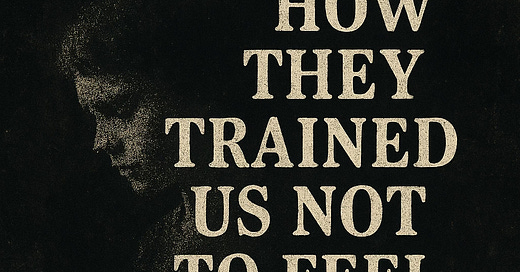Return to the Emotional Heresy Series Hub
The Programming That Taught Us to Abandon Our Hearts
A word to the reader:
You weren’t born numb.
You were taught to be.
You came into the world wailing—full-bodied, unfiltered, honest.
And slowly, they trimmed your emotional language to what made them comfortable.
They didn’t teach you how to feel.
They taught you how to perform safety by not feeling.
If you’ve ever wondered why empathy is hard, why softness makes you flinch, or why your first instinct is to apologize for crying—
You didn’t fail.
You were trained.
Tiny Moments That Shaped an Entire Emotional Landscape
It wasn’t always overt.
No one handed you a manual called “How to Abandon Your Heart.”
But they didn’t need to.
“Stop crying or I’ll give you something to cry about.”
“You’re just being dramatic.”
“Boys don’t cry.”
“You need to forgive and forget.”
“God doesn’t like complainers.”
“She’s just emotional—ignore her.”
Every phrase a brick.
Every correction a chiseling.
And before long, the architecture of your inner world no longer felt like home.
You learned that tears made people uncomfortable.
That anger meant rebellion.
That fear was faithlessness.
That even joy could be too much.
We weren’t taught to regulate our emotions.
We were taught to erase them.
Religion Didn't Just Shame Sin. It Shamed Feeling.
In many churches, emotion was either suspect or strategically harnessed.
You could cry at the altar—if it pointed to repentance.
You could feel joy—if it proved your salvation.
But anger at injustice? Grief that lingered? Compassion for someone who “deserved” consequences?
That was too much.
You were told:
“The heart is deceitful above all things.” (Jeremiah 17:9)
“Lean not on your own understanding.” (Proverbs 3:5)
“Die to yourself.” (Romans 6)
And somewhere along the way, “self” stopped meaning ego…
and started meaning emotion.
You were told to crucify your feelings as if they were demons in disguise.
We mistook dissociation for devotion.
We called emotional abandonment faithfulness.
The Systems That Benefit When We Can’t Feel
It wasn’t just religion.
Patriarchy, white supremacy, and capitalism all feed on emotional numbness.
A boy who can’t cry becomes a man who can’t apologize.
A girl who’s praised for her emotional labor becomes a woman who says yes when she means no.
A congregation trained to distrust their inner world becomes easier to control.
A nation numbed to suffering becomes easier to govern.
And here’s the terrifying brilliance of it all:
When you suppress emotion long enough, you stop trusting it.
And then you don’t need to be controlled.
You’ll control yourself.
What It Did to Us
This is what unfeeling looks like:
Smiling when you’re breaking inside
Apologizing for your tears before they’ve even fallen
Struggling to say no, because discomfort feels like danger
Wanting to scream but fearing it would make you “unlovable”
Becoming the peacekeeper, the fixer, the forgiver, the performer
Not knowing what you feel until it becomes pain
We didn’t lose our empathy.
We learned to lock it in a room—
then forgot where we put the key.
Relearning to Feel Is an Act of Liberation
There is no altar call for this kind of healing.
No dramatic moment where the numbness breaks and all is restored.
This is slow work.
Uneven. Holy. Sometimes terrifying.
It begins when you whisper the forbidden words:
“I’m not okay.”
“That hurt.”
“I feel something, and it matters.”
Relearning to feel doesn’t mean letting your emotions run wild.
It means finally letting them exist.
It means recognizing that your body has been speaking in symptoms—because your soul was never allowed to speak in language.
It’s waking up one day and realizing:
You can feel anger without becoming dangerous.
You can feel grief without being broken.
You can feel joy without fearing it will be taken away.
You can say “no” and still be good.
You can cry without apologizing.
You can feel, and still be safe.
This is the unlearning of obedience-based worth.
This is the spiritual practice of reparenting your nervous system.
This is what it means to return home to yourself.
Emotion Is Not the Enemy. It’s Evidence.
What if your tears weren’t weakness but intelligence?
What if your empathy wasn’t immaturity but insight?
What if your emotions were not the things to conquer—but the sacred signals that you’re still alive?
When you numb yourself to sadness, you also numb joy.
When you suppress rage, you flatten courage.
When you bury fear, you silence your intuition.
When you call emotion a flaw, you disconnect from the very source of your human and divine wisdom.
Your feelings are sacred data.
To feel again is not failure.
It is the first sign that resurrection is already happening.
A Question for Reflection
What’s one emotion you were told you weren’t allowed to feel?
What would it mean to feel it now—and trust that it’s not dangerous, but true?




